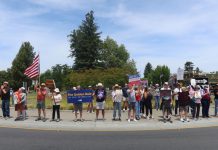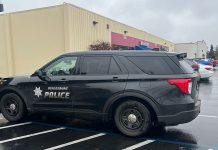A request from Healdsburg’s vice mayor to pursue a building reach code update that would include a ban on all-natural gas — creating all-electric reach code — couldn’t get enough traction Feb. 7 from fellow city council members in order to move forward despite resident support of such a ban.
Instead of pushing onward with this option, Vice Mayor Ariel Kelley’s colleagues cited a desire to work toward making existing buildings more energy efficient, looking at other ways to reduce greenhouse gas emissions — such as electrifying the city’s utility truck fleet — and the need for natural gas during public safety power shut offs (PSPS) when electricity is not available.
A reach code is an ordinance that goes above state requirements on energy use to try and break dependency on fossil fuels by mandating that new construction for residential or commercial use either mixed gas and electric, partial electric or all-electric cooking and heating options.
The city’s current reach code was approved by council in 2019 and is a mixed reach code, meaning it requires electric space and water heating, but allows for natural gas for cooktops, fireplaces and swimming pools.
Under the code, non-residential buildings are also required to have electric space and water heating, but are allowed gas for cooktops, fireplaces, pool heating and for use when using electric options aren’t feasible.
The majority of the council indicated interest in keeping the current reach code as is and nixing the pool exemption.
As part of its regular city council meeting on Monday, Feb. 7, the Healdsburg City Council was asked to provide direction to city staff regarding the requirement of building electrification in new buildings during the upcoming 2022 building code cycle.
The City of Healdsburg’s existing reach code will expire at the end of 2022. To continue to reduce greenhouse gas emissions associated with new buildings, the city will need to either re-adopt the current reach code, adopt a revised code or consider an alternate policy.
Healdsburg Utility Director Terry Crowley presented the council with three options for updating the code.
The code could remain as it is, allowing gas for cooking, fireplaces and pool heating.
Alternatively, the current code could be altered to remove the prescribed exemptions. The third option would be to implement a natural gas ban, which could go into effect 30 days after the second-final reading of the ordinance.
The natural gas ban would not apply to projects, such as the Mill District, that are already in the works and were permitted prior to the ordinance taking effect.
Crowley noted that the affordable housing portion of the Mill District is being built all electric, but the market rate housing will be plumbed for gas.
“Natural gas will always be a dirty source of electricity and it’s both dirty in the home when you’re breathing it in and when you’re cooking and it’s also dirty at its source,” Vice Mayor Kelley said during reach code deliberation. “While it is clear Healdsburg has already taken the huge leap forward back in 2019 when our council chose to do all electric buildings except for the three exemptions, I think about the 40 other cities that have adopted it since then across California and the volume (of) that speaks to collective action. It is my feeling we are absolutely in a crisis … I have no reservations around asking that we push for option three.”
Option three would mean city staff would not have to reanalyze the reach code every three years like it would have to do with option one or two.
During public comment, several people urged the council to consider moving forward with option three.
“We’re in a climate crisis right now. I thank you for adopting the reach code in 2019, but clearly it’s (the climate crisis) gotten worse since then and we need to do the most we can right now to stop our reliance on fossil fuels,” said Stephanie Turk.
Ty Benoit, a former Wikiup resident who lost her home in the Tubbs Fire who’s been working on creating an all-electric home in Healdsburg, urged the council in 2019 to make the reach code more rigorous by taking out all-natural gas use. Benoit once again urged the council to adopt an all-electric reach code.
Richard Burg, Merrilyn Joyce and Anne Niederberger also supported the all-electric reach code option.
“We need to get serious here and we need to stop investing in gas infrastructure,” Niederberger said.
Lisa Wittke Schaffner, the CEO of the Northcoast Builders Exchange, said while there is a greenhouse emission crisis, the area is also facing an affordable housing crisis.
“So, anything we can do to make sure that people want to build in Healdsburg is very important at this point in time. It’s really our old buildings here in Healdsburg (that are less emergency efficient), and I probably live in one right now that I’ve tried to get more energy efficient,” Wittake Schaffner said.
Councilmember David Hagele said he is more inclined to stick with option one, to keep the code as is, but to forgo the pool exemption.
“Our ultimate goal is to reduce GHG emissions. We’ve taken two easy steps that have had more of an impact than our reach code in 2019. One is when we redid the Recology contract we slipped in language that said when the first electric garbage truck is ready, we get it … and we also now have an electric bus… We have floating solar, we are converting the Lodi energy center to accommodate hydrogen, we have geothermal facilities, we have hydro facilities. Healdsburg is part of a publicly owned utility that actually generates power, so when we’re talking about action and what we’re doing to me, those are bigger things,” Hagele said.
He also had concerns about PSPS events with regard to an all-electric code. He said when he and his family had to evacuate during the Kincade Fire they were able to go to a place with a gas stove and feed and provide warmth for their family despite the large PSPS event that was occurring at the time.
Councilmember Evelyn Mitchell was in support of option one and removing the pool exemption and Mayor Ozzy Jimenez was also more inclined to pursue option one, citing the PSPS concern.
“What I would like to see is how do we work with partners like RCPA (Regional Climate Protection Authority) in an intentional way? In the city of Sebastopol, they have a Sparks Fellow that works with community partners to help map out some sort of plan and I haven’t seen that, and I don’t think amending this to option three is appealing for me right now,” Jimenez said.
Councilmember Skylaer Palacios said she would like to see a comparison of option two and three and what the reduced greenhouse gas emissions would look like under those two options.
With a majority consensus to move forward with option one, the item will return to council at a later date. The development of a reach code first requires the development of a draft ordinance, review of compliance with a cost-effectiveness study and a public process to adopt the ordinance.









